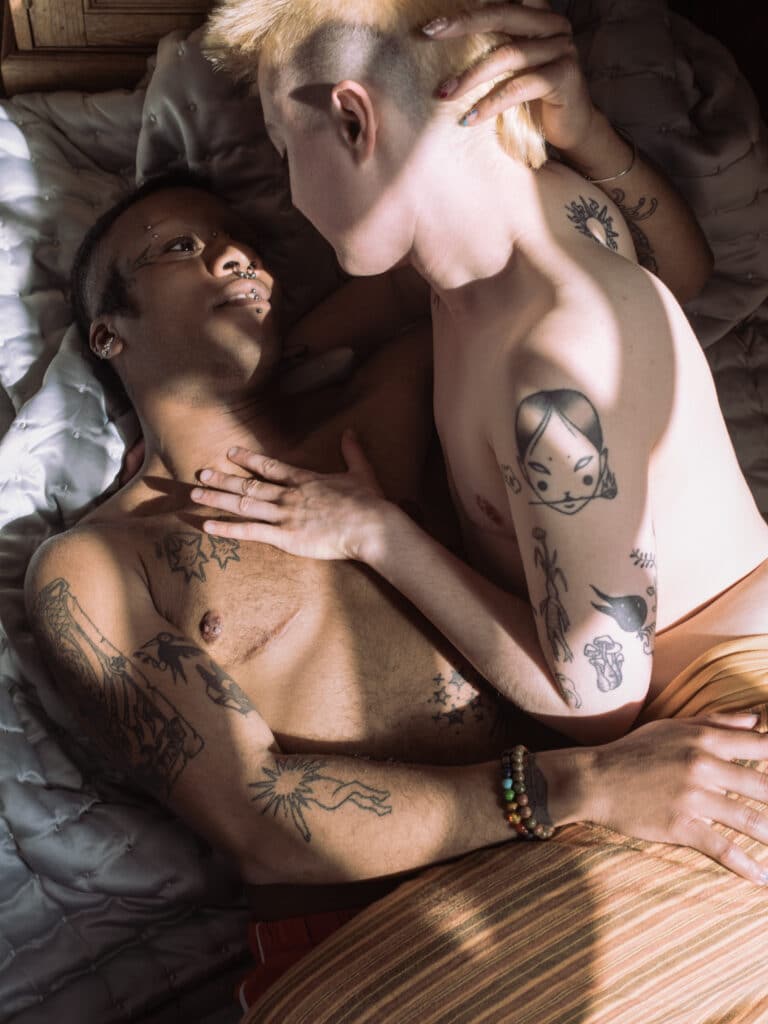Most queer sex is fun and educational – but not everybody is getting what they want, study shows

Durex wants us all to have better sex. Durex)
For many of us, the pandemic provided an opportunity to think more deeply about ourselves, our relationships with other people and what truly stimulates us – because let’s face it, we’ve certainly had the time!
Education is part of any good sex life, impacting pleasure, health and confidence – and that’s exactly what Durex set out to explore through its My Sex My Way campaign. The brand believes that hearing from the community directly is an important part of learning how to be a better ally to LGBT+ people.
So, in partnership with PinkNews, Durex conducted a UK sex survey to discover more about the LGBT+ community.
An incredible 5,457 people across the UK ‒ and across the LGBT+ acronym ‒ participated in Durex’s Inclusivity Survey. The questions covered five key areas: sexual fulfilment, sex education, dating, sexual health and self-acceptance. The results paint a striking picture of how Britain’s LGBT+ community experiences – and enjoys – sex, and issues that continue to trouble them.
Sex education
LGBT-inclusive sex education is vital – everything from HIV and PrEP to enthusiastic consent what goes where and the importance of using lube. Human rights experts agree that inclusive sex ed at schools “overwhelmingly” benefits both the young people receiving it and society at large: reducing risky sexual behaviour and bolstering attitudes towards sexual and reproductive health. It’s taken until the 2020s for schools to be legally obliged to deliver such lessons, and while it’s certainly better late than never, it’s clear that many of us are still dealing with the hangover of missing out (if that’s true for you, the LGBT Foundation is a good place to start learning).

Many LGBT+ people learn more about sex from partners than from school settings. (Durex)
The survey results, collated by Harris International in June 2021, show that less than one in 10 LGBT+ people feel that they sex education they received gave them the confidence to be their true sexual self, and just 14 per cent felt sex education was a positive or relevant experience to them. Most LGBT+ people have learned more about sex from alternative sources of education including their sexual partners (76 per cent) or from porn (64 per cent), which might be because only 28 per cent of those surveyed thought their sex education teacher was knowledgeable. Nearly half of both LGBT+ and straight respondents said the topic was either not covered or was even actively avoided. And a larger proportion of LGBT+ respondents tended to have a broader definition of what constitutes sex and intimacy, compared to straight people.
There is some good news, though: 42 per cent of LGBT+ respondents think that inclusive sex education is improving. It’s taken a long time, but finally young queer people are starting to get what they deserve, which can only be a good thing.
Sexual fulfilment and dating
On to the better news: the survey found a generally sex-positive attitude from LGBT+ people towards themselves and others. Queer people face enough stigma in life, so it’s encouraging to see that in the bedroom, we’re being encouraging and affirming of each other from an emotional and psychological perspective. Nine out of 10 say sex is fun, 82 per cent feel accepted in sex by their partner and 78 per cent believe their sexual fulfilment has been improving over time. Anecdotally, many feel that sex and confidence are intrinsically linked, so this is great news.
Interestingly, lesbians scored particularly highly in in terms of sex-positive statements, but only 36 per cent of lesbians feel that protection and lube products available are made with them in mind. Overall, LGBT+ respondents were happier with the physical aspects of their sex lives (71 per cent) than the emotional side (63 per cent). Gay men were less happy with the emotional aspect of their sex lives, compared to other groups.

The majority of queer people feel accepted by their friends. (Durex)
When it comes to dating, the LGBT+ community seem to enjoy dating more than those out of it. Seventy-two per cent enjoy dating and 73 per cent think that dating apps help them fully explore their sexual identity. But looking a little closer, the experiences differ for some groups. Trans people, for instance, are more likely to experience discrimination while dating – no surprise given the rise of transphobic offences in the UK. Trans people also raised concerns about having felt fetishised by partners. And as for LGBT+ dating representation in the media and pop culture, only 23 per cent of LGBT+ respondents thought that queer dating is fully represented. (Love Island, we’re looking at you!)
Sexual health and self-acceptance
Self-acceptance paints a mixed picture. Ninety-two per cent of LGBT+ respondents feel their community is accepted by their friends, while three in four respondents feel proud of who they are. Just like we’ve seen already, these results vary for different identities, with gay men being the most likely to think society is accepting them and trans people being less likely to think so – highlighting the importance of allyship between communities. Perhaps most dispiritingly, just 13 per cent of LGBT+ people feel society accepts the LGBT+ community overall. That’s not good enough.
In terms of sexual health, LGBT+ survey respondents were found to be more likely to use lube and sex toys than straight people (no surprises there!). Seventy per cent also said they have been tested for STIs in the past. Interestingly, LGBT+ respondents were more likely to use online sexual health resources and specialist services, but less likely to ask their GP about sexual health. When you consider that many in the LGBT+ community experience prejudice in the healthcare system, this comes as no surprise. If you’ve experienced discrimination, know that there are LGBT-affirming services that will treat you with respect, including 56 Dean Street in London and the LGBT Foundation in Greater Manchester. Stonewall has a list of resources for other areas.
What’s next
Durex’s survey makes for fascinating reading, giving us a wider look at LGBT+ life in the UK today. Some of the results are difficult to hear, but others are much more hopeful. When it comes to the role brands like Durex can play in building bridges with the LGBT+ community, surveys like this help to further include queer people in the brand’s mission: championing self-acceptance for all.
As Lindsay Forbes, wellness category manager at Durex, explains: “At Durex, we want to help everyone achieve sexual satisfaction, physically and emotionally. We believe with even more inclusive and supportive sex ed, so many more people will feel free to explore their identity. If sex ed remains exclusive of LGBTQ+ issues, all pupils regardless of their sexual identity will be lacking in the knowledge and awareness needed for a wholly accepting society, full of individuals confident with their sexual selves.
“As part of our continued ambition to become a better ally to the LGBTQ+ community and a champion for a sex positive society, Durex is committed to working alongside trusted partners including Her, Grindr and a team of LGBTQ+ educators, to provide and curate informative, inclusive and reliable educational resources to all those who need them. Durex has also partnered with The Proud Trust to support its teams in their efforts to educate through bespoke programmes delivered across the country to teachers, support workers and young people. A first step in helping to change the sex ed narrative.”
Everyone, regardless of their identity, deserves to feel pleasure and acceptance. Until that goal is a reality for LGBT+ people everywhere, there’s still meaningful change that can happen. So let’s do it.
To find out more, visit Durex.
RB-M-56498

